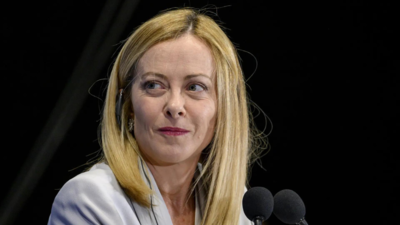ARTICLE AD BOX

Italian Prime Minister Giorgia Meloni
ROME: Hundreds of thousands of people attended protests in Rome last month hailed as a show of strength against Giorgia Meloni's hard-right government, but Italy's divided opposition is struggling to make an impact.Almost three years after its historic election victory, Meloni's far-right Brothers of Italy party remains the most popular, polling at 29 percent -- above the 26 percent it secured in the September 2022 vote, according to the latest YouTrend survey.The prime minister herself tops polls of party leaders with an approval rating of 45 percent, according to Ipsos.The traditional left is struggling across Europe, where populist parties -- particularly the far-right -- have gained ground in recent years.And in Italy, which once had Western Europe's largest Communist Party, "there is a crisis in the left", commented Paolo Borioni, professor of political science at Rome's Sapienza University.He said left-wing parties had "severed their historical class ties", notably with those on lower incomes.The opposition is dominated by the centre-left Democratic Party (PD), currently polling at around 22 percent, and the Five Star Movement, with around 13 percent.
Marc Lazar, a professor at Sciences Po Paris and Luiss University in Rome, said both are paying the price for their record in government, where they "disappointed, they did not address social issues".The PD adopted several measures that liberalised the labour market and cut public spending while in power after the 2013 election. Since then, they have lost over three million votes.For its part, the Five Star triumphed in 2018 elections on an anti-establishment message, only to ally with its declared enemies while in government.- Gaza, Ukraine -The PD chose a new leader after the 2022 elections, Elly Schlein, who has tacked further left, championing a national minimum wage and increased spending on education and healthcare.The Five Star under former premier Giuseppe Conte is also pushing for a minimum wage and a basic income for the most vulnerable. "Meloni, like all the right, claims to defend the people but only defends the big hedge funds, the big banks," Riccardo Ricciardi, president of the Five Star parliamentary group in the Chamber of Deputies, told AFP.Both parties have also sought to mobilise public concern about rising defence budgets and Israel's offensive in Gaza.Five Star threw its weight behind a large protest in Rome last month against rearmament, an issue that Lazar noted "poses a challenge to Giorgia Meloni" in a country with a long tradition of peace movements.But divisions on the issue within the PD have undermined the opposition's ability to attack the government.Both the PD and Five Star also backed a huge protest on Gaza, but some PD supporters accused Schlein of being slow to take up the issue."They lack courage," lamented Arianna D'Archivio, a 23-year-old student organiser at the rearmament protest.A third large demonstration took place for Pride, an explicit challenge to Meloni's socially conservative agenda.- Vote alliances -Meloni shares government with the smaller far-right League party and the centre-right Forza Italia, which gives her a majority in parliament.Despite their differences, PD and Five Star have tried teaming up at the ballot box, with joint candidates winning regional elections in Emilia-Romagna and Umbria in 2024, as well as the northern city of Genoa in May. They also both supported a recent referendum on labour market reform, although it failed due to low turnout.Schlein insisted the PD was making progress."We will happily leave the polls to Meloni's right, but we are winning elections," she told AFP at a recent event.The PD performed better than expected in last year's European Parliament elections, winning 24 percent of the vote, compared to 29 percent for Meloni's party -- but with a historically low turnout.- Disconnected -For Dario Salvetti, an auto industry worker from Florence, the left is "broken", "disconnected from the masses" in a country where salaries have been stalled for decades and one in ten Italians is classified as living in poverty.For analyst Borioni, there is "no rightward shift in the population in Italy", just more people are abandoning the left.Activists meanwhile see the problem as politics, not the left itself.Francesca Ciuffi, a 27-year-old trade unionist in the textile hub of Prato, noted their recent successes in improving conditions for workers following strikes."The big unions and left-wing parties have abandoned their role," she said.



.png)
.png)
.png)
















 4 hours ago
2
4 hours ago
2









 English (US) ·
English (US) ·